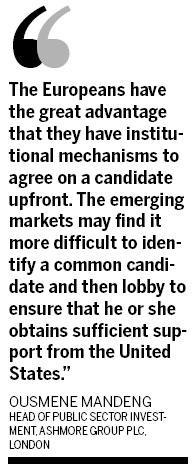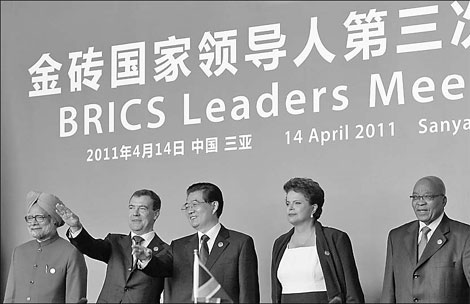Society
No agreement yet on new IMF chief
Updated: 2011-05-23 07:56
By Shamim Adam (China Daily)
|
From left to right: Manmohan Singh, India's prime minister, Dmitry Medvedev, Russia's president, Hu Jintao, China's president, Dilma Rousseff, Brazil's president, and Jacob Zuma, South Africa's president, pose for a group photo in Sanya, Hainan province. Leaders from Brazil, Russia, India, China, and South Africa met on April 14 for the 2011 BRICS Summit. Hwee Young How / Pool Via Bloomberg |
Several candidates suggested as Strauss-Kahn's replacement
SINGAPORE - The failure of emerging-market nations to rally behind a single candidate to head the International Monetary Fund (IMF) shows the effort still needed to link diplomatic might with growing economic strength.
As the IMF begins its search for a successor to Dominique Strauss-Kahn, Russia is endorsing Grigori Marchenko, the head of Kazakhstan's central bank, while the Philippines and Thailand speak favorably of Singapore Finance Minister Tharman Shanmugaratnam. India, China, Brazil and South Africa have yet to throw their support behind anyone even as they urge selection be driven by merit rather than nationality.
By contrast, European Union nations have given overwhelming support to French Finance Minister Christine Lagarde to head the Washington-based IMF, the institution that approved a record $91.7 billion in emergency loans last year and provides a third of the euro-area's bailouts. That left Asians, South Americans and Russia talking principles without agreeing on one person.
"The Europeans have the great advantage that they have institutional mechanisms to agree on a candidate upfront," said Ousmene Mandeng, head of public sector investment at Ashmore Group Plc in London and a former IMF economist. "The emerging markets may find it more difficult to identify a common candidate and then lobby to ensure that he or she obtains sufficient support from the United States."
As recently as last month the leaders of Brazil, Russia, India and China, known as the BRIC countries, were urging the US and Europe to end their 65-year monopoly on leadership positions at the IMF and World Bank, which has always been headed by an American. South Africa is now part of the group, which consequently changed its name to BRICS.
June 30 goal
The IMF said it aims to complete the selection of a successor to Strauss-Kahn by June 30. Countries will be able to nominate candidates for the managing director's position between May 23 and June 10, the IMF said in a statement.
"The governing structure of the international financial institutions should reflect the changes in the world economy, increasing the voice and representation of emerging economies and developing countries," the BRICS leaders said in a statement after meeting in Hainan, China, on April 14.
Those positions were echoed by finance chiefs last week following the arrest and subsequent resignation of Strauss-Kahn. The new leadership should reflect changes in the world economy, People's Bank of China Governor Zhou Xiaochuan said on May 19.
Their failure to follow such calls with action probably highlights the political immaturity of the BRICS complex even when "the case for the new IMF head to come from the BRIC countries is increasingly strong," said Jim O'Neill, who created the BRIC term and chairs Goldman Sachs Asset Management in London.
Former Brazilian central bank chief Arminio Fraga, one-time South African Finance Minister Trevor Manuel and Indian policy maker Montek Singh Ahluwalia are among the emerging market representatives capable of leading the IMF, according to the fund's former chief economist, Simon Johnson. He also suggests the possibility of Bank of Mexico Governor Agustin Carstens and Zhu Min, a former Chinese central banker now working at the IMF.
"The big political question is whether the largest emerging markets - Brazil, China, India, South Africa, Turkey and perhaps Saudi Arabia, South Korea, Russia, Indonesia and Mexico - can unify behind one candidate," Johnson wrote in a May 18 Bloomberg News column. "That would be a breakthrough but it's still not clear who will provide the diplomatic initiative to organize them into a coalition that speaks with a single voice."
The Chilean government said on Friday it has a "good opinion" of former Finance Minister Alejandro Foxley as a possible candidate and will consider nominating him.

US Treasury Secretary Timothy Geithner has refrained from mentioning any names, insisting in a statement he wants a quick decision on a candidate who can command broad support.
"We are consulting broadly with the fund's shareholders from emerging markets, as well as advanced economies," Geithner said. "It is important that this be an open process and one that moves quickly to select new leadership for the IMF."
Shen Jianguang, a former IMF economist and now at Mizuho Securites Asia Ltd, said in a Bloomberg Television interview that one option is to promote Zhu Min the first deputy managing director, to the IMF's No 2 position.
"Zhu Min definitely can be a deputy CEO of the IMF" given the growing importance of China in the world economy, he said. "Emerging markets are not very happy with the situation that the head of the IMF has to be from Europe."
Lipsky's term
John Lipsky, 64, is acting managing director after Strauss-Kahn's resignation four days after his May 14 arrest in New York on charges of attempted rape and sexual assault. Lipsky's term in the IMF's No 2 post, which has traditionally been filled by an American, ends in August.
The biggest emerging economies have focused on increasing trade and financial links among their nations. The state development banks of the BRICS countries agreed to help boost the use of local currencies when making loans within the five nations, Indian Prime Minister Manmohan Singh said last month. While early signs point to Lagarde, the mood could swing in the weeks to come.
"The US and Europe should take it upon themselves to really open this up to all candidates that are qualified, not necessarily just Europeans," the Philippines' Finance Secretary Cesar Purisima said in a Bloomberg Television interview.
Bloomberg News
(China Daily 05/23/2011 page14)
Specials

Suzhou: Heaven on Earth
Time-tested adages sing praises of Suzhou, and Michael Paul Franklin finds it's not hard to understand why on a recent visit.

The sky's the limit
Chinese airline companies are increasingly recruiting pilots and flight attendants as the industry experiences rapid expansion.

Diving into history
China's richest cultural heritage may lie in the deep, like exhibits in a giant underwater museum.
